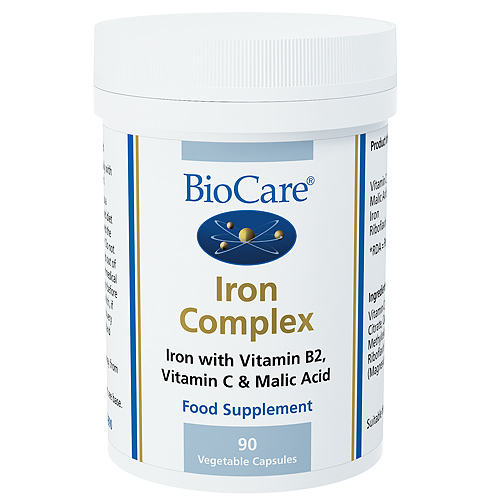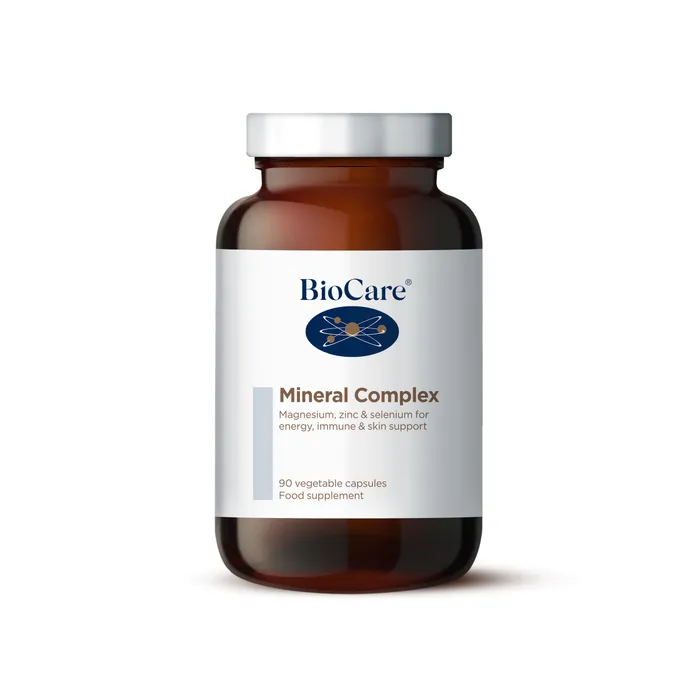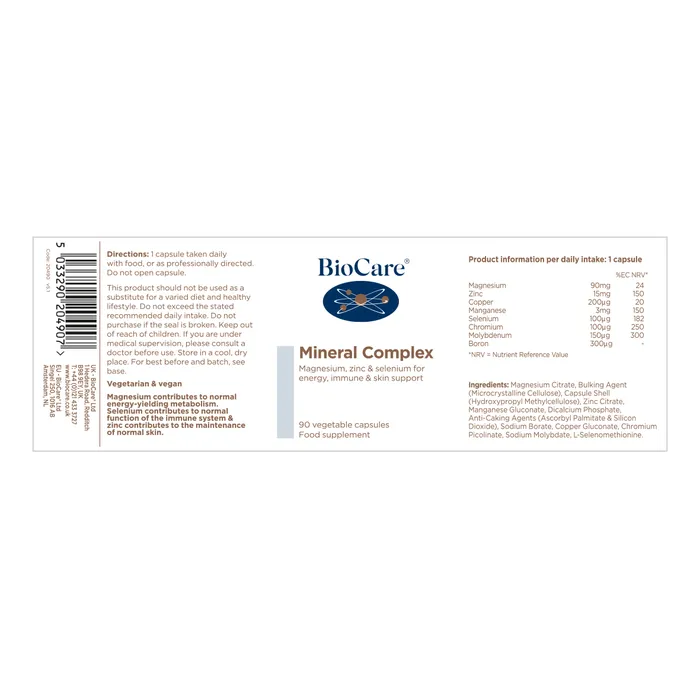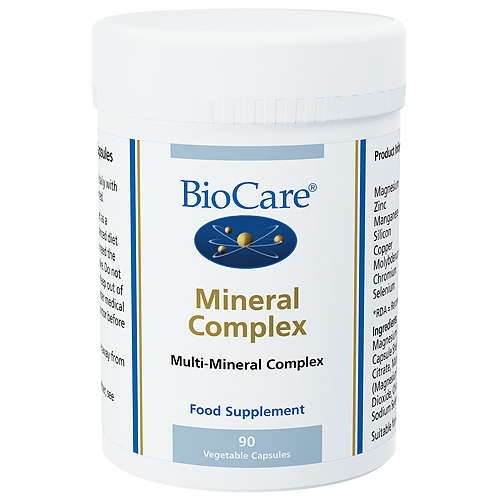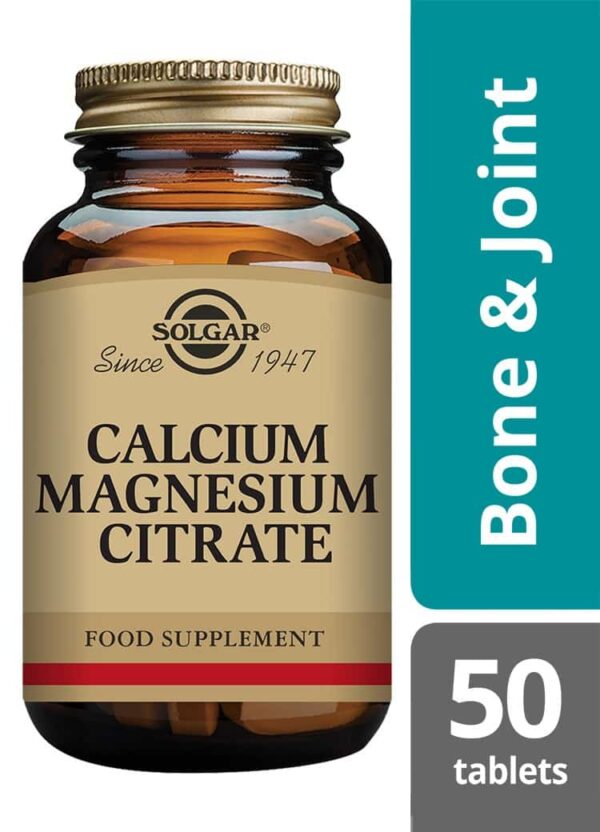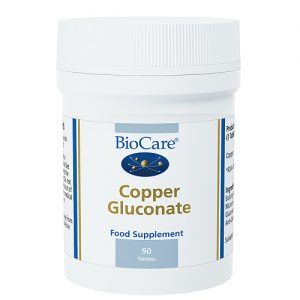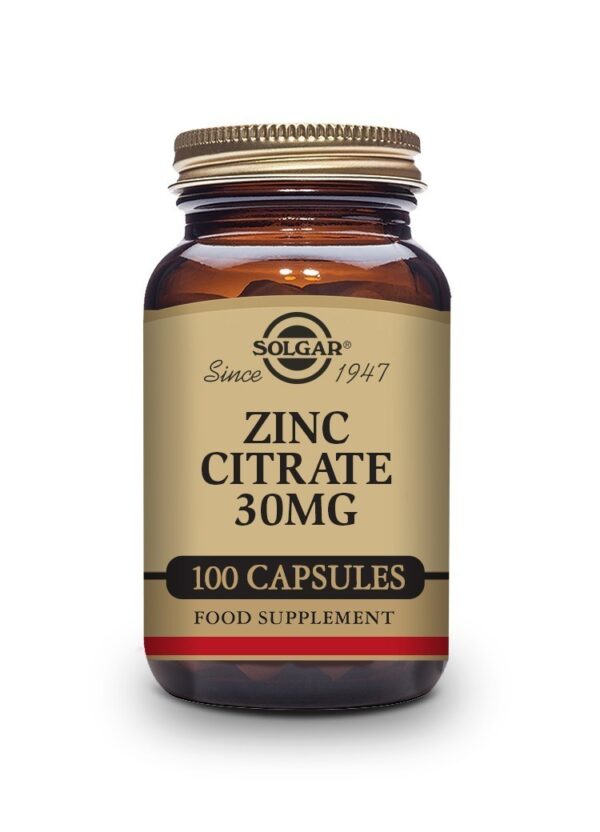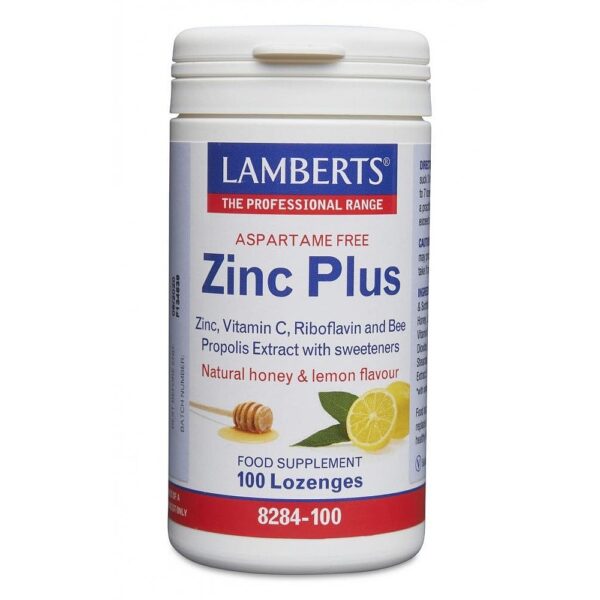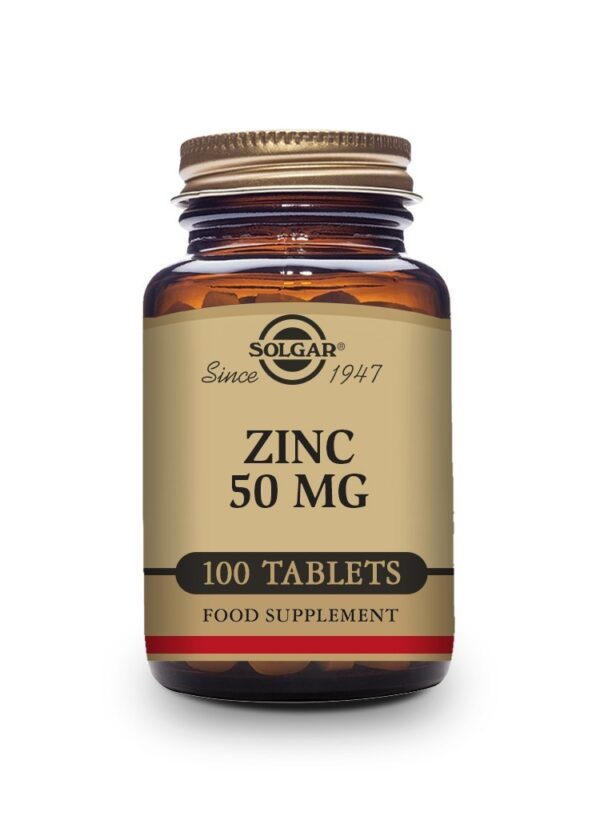Description
Mineral Complex
BioCare Mineral Complex is a dietary supplement that typically contains a combination of essential minerals. The specific formulation can vary, but common minerals found in such complexes include:
-
Calcium, Magnesium, Potassium, Zinc, Iron, Manganese, Copper, Iodine, Selenium, Chromium, Molybdenum
Uses:
BioCare Mineral Complex, like other mineral supplements, is intended to:
-
Address Mineral Deficiencies: To help correct or prevent deficiencies in one or more essential minerals. Deficiencies can occur due to poor diet, malabsorption issues, certain medications, or specific health conditions.
-
Support Overall Health and Well-being: To contribute to the proper functioning of various bodily processes that rely on minerals.
-
Support specific health needs: Depending on the mineral composition, it may target bone health, energy production, immune function, etc.
Health Benefits (related to the individual minerals present; the benefits of a complex depend on its specific composition):
It’s crucial to understand that the benefits come from the individual minerals within the complex. Here’s a breakdown of common minerals and their roles:
-
Calcium:
-
Bone Health: Essential for building and maintaining strong bones and teeth.
-
Muscle Function: Involved in muscle contraction and nerve transmission.
-
Blood Clotting: Plays a role in blood clotting processes.
-
Nerve Function: Helps transmit nerve signals.
-
-
Magnesium:
-
Muscle and Nerve Function: Supports normal muscle and nerve function.
-
Energy Production: Involved in energy metabolism and ATP production.
-
Bone Health: Contributes to bone density.
-
Blood Sugar Control: Helps regulate blood sugar levels.
-
Blood Pressure Regulation: May help maintain healthy blood pressure.
-
Enzyme Activity: A cofactor for hundreds of enzymatic reactions.
-
-
Potassium:
-
Fluid Balance: Helps regulate fluid balance within cells.
-
Muscle Contraction: Important for muscle contraction.
-
Nerve Impulses: Essential for nerve impulse transmission.
-
Blood Pressure: Helps maintain healthy blood pressure.
-
-
Zinc:
-
Immune Function: Crucial for immune system function.
-
Wound Healing: Involved in wound healing.
-
Cell Growth and Division: Essential for cell growth and division.
-
Sense of Taste and Smell: Important for taste and smell.
-
DNA Synthesis: Required for DNA synthesis.
-
-
Iron:
-
Oxygen Transport: Essential for carrying oxygen in red blood cells (hemoglobin).
-
Energy Production: Involved in energy production.
-
Immune Function: Supports immune function.
-
Cell Growth: Necessary for cell growth.
-
-
Manganese:
-
Bone Formation: Involved in bone formation.
-
Antioxidant Activity: Contributes to antioxidant defense (part of superoxide dismutase).
-
Metabolism: Involved in carbohydrate, protein, and fat metabolism.
-
-
Copper:
-
Iron Metabolism: Helps with iron metabolism.
-
Connective Tissue Formation: Involved in forming connective tissues.
-
Nerve Function: Supports nerve function.
-
Antioxidant Activity: Contributes to antioxidant defense.
-
-
Iodine:
-
Thyroid Hormone Production: Essential for thyroid hormone production, which regulates metabolism.
-
-
Selenium:
-
Antioxidant Activity: A powerful antioxidant that protects cells from damage.
-
Thyroid Function: Important for thyroid hormone metabolism.
-
Immune Function: Supports immune function.
-
-
Chromium:
-
Blood Sugar Control: May help improve insulin sensitivity and blood sugar control.
-
Metabolism: Involved in carbohydrate, fat, and protein metabolism.
-
-
Molybdenum:
-
Enzyme Activity: A cofactor for several enzymes involved in metabolic processes.
-
Waste Removal: Helps with the removal of waste products.
-
Dosage:
The dosage of BioCare Mineral Complex will vary depending on the specific product formulation and the individual’s needs. It is crucial to follow the dosage instructions on the product label or as advised by a healthcare professional. Do not exceed the recommended dosage.
Safety and Side Effects:
-
Generally considered safe when taken as directed.
-
Possible Side Effects:
-
Gastrointestinal Upset: Nausea, stomach cramps, diarrhea, or constipation can occur, especially at higher doses.
-
Mineral Imbalances: Excessive intake of one mineral can interfere with the absorption or utilization of other minerals, leading to imbalances.
-
Specific Mineral Side Effects: High doses of certain minerals can have specific side effects (e.g., iron causing constipation, zinc causing copper deficiency).
-
-
Drug Interactions: Mineral supplements can interact with certain medications.
Interactions:
Mineral supplements can interact with various medications, including:
-
Antibiotics: Certain antibiotics (e.g., tetracyclines, quinolones) can bind to minerals, reducing their absorption.
-
Bisphosphonates: Used to treat osteoporosis; calcium can interfere with their absorption.
-
Levothyroxine: Used to treat hypothyroidism; calcium and iron can interfere with its absorption.
-
Diuretics: Some diuretics can increase the excretion of certain minerals, such as potassium and magnesium.
-
Proton Pump Inhibitors (PPIs): Can reduce the absorption of magnesium and other minerals over long-term use.
-
Chelating Agents: Medications used to remove heavy metals from the body; they can also bind to essential minerals.
Important Considerations:
-
Food Sources First: Ideally, you should obtain minerals from a balanced diet rich in fruits, vegetables, whole grains, and lean protein. A mineral complex should be used as a supplement to a healthy diet, not a replacement for it.
-
Individual Needs: Mineral requirements vary based on age, sex, health status, and other factors.
-
Specific Deficiencies: If you suspect you have a mineral deficiency, it’s essential to get tested by a healthcare professional to determine which minerals you are deficient in and the appropriate dosage for supplementation. Don’t self-diagnose.
-
Bioavailability: The form of the mineral in the supplement can affect its bioavailability (how well it is absorbed and utilized by the body). Some forms (e.g., citrate, chelate) are generally better absorbed than others (e.g., oxide).
-
Quality: Choose reputable brands that test their products for purity and potency. Look for third-party certifications (e.g., USP, NSF International) to ensure quality.
-
Consult a Healthcare Professional: Before taking BioCare Mineral Complex or any other mineral supplement, it is essential to consult with a healthcare professional (doctor, registered dietitian, or other qualified healthcare provider). This is especially important if you have any underlying health conditions, are taking any medications, are pregnant or breastfeeding, or are planning to give it to a child. They can help you determine if a mineral complex is appropriate for you, assess your individual needs, recommend the right dosage, and monitor for any potential side effects or interactions.
-
Avoid Overdosing: Taking excessive amounts of minerals can be harmful and lead to toxicity. Always follow the recommended dosage instructions.
In summary, BioCare Mineral Complex can be a useful way to supplement your diet with essential minerals, especially if you have a known deficiency or increased need. However, it is crucial to use it safely and under the guidance of a healthcare professional to avoid potential risks and ensure that it meets your individual needs. Prioritize a healthy diet as the foundation of your mineral intake.

